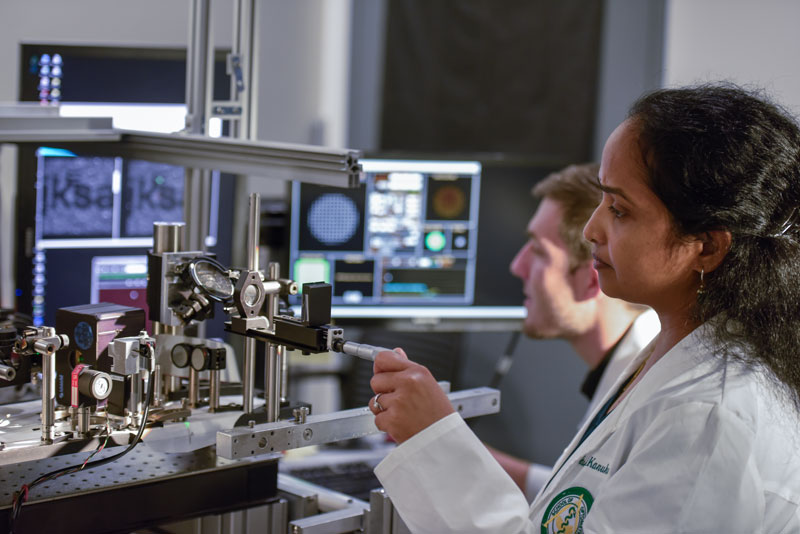Looking for exceptional vision care and eyewear selection in Pensacola? Look no further than 50 Dollar Eye Guy! Our team of friendly and professional doctors, including Doctors Grace and Joseph Tegenkamp and Dr. Jeanine Spoors, are committed to providing outstanding customer service to each and every patient. We pride ourselves on personalized care, taking the necessary time to ensure a comfortable experience. With a focus on Comprehensive Eye Exams and a wide variety of fashionable eyewear, we strive to provide the best possible vision care. Come in today to meet our incredible team and schedule an appointment. At 50 Dollar Eye Guy, your vision is our passion.
Research and Studies in Optometry
Optometry is a branch of healthcare that focuses on the examination, diagnosis, and treatment of the eyes and vision-related issues. It plays a crucial role in improving vision care and helping individuals maintain good eye health. Over the years, extensive research and studies have been conducted within the field of optometry to enhance our understanding of various eye conditions and develop innovative solutions. In this article, we will explore some key areas of research and studies in optometry.
Importance of Research in Optometry
Research in optometry plays a vital role in advancing the field and improving patient care. It allows optometrists to stay updated with the latest advancements, techniques, and treatments. By conducting research, optometrists can gain valuable insights into the effectiveness of different interventions, evaluate the safety and efficacy of new technologies, and contribute to the development of evidence-based practices. Optometric research also helps in identifying and addressing gaps in current knowledge, leading to improved patient outcomes.
Advancements in Diagnostic Technologies
One area of optometric research that has significantly contributed to the field is the development of advanced diagnostic technologies. These technologies enable optometrists to accurately detect and diagnose various eye conditions at an early stage, allowing for timely interventions and treatments. For example, the use of optical coherence tomography (OCT) has revolutionized the diagnosis and monitoring of diseases such as glaucoma and macular degeneration. OCT provides detailed cross-sectional images of the different layers of the retina, helping optometrists identify subtle changes and make precise diagnoses.
Understanding Myopia and its Management
Myopia, commonly known as nearsightedness, is a condition where individuals have difficulty seeing objects in the distance. In recent years, there has been an increase in the prevalence of myopia worldwide, making it a significant public health concern. Optometric research has been instrumental in understanding the underlying causes of myopia and developing effective management strategies. Studies have shown that factors such as genetics, environmental factors, and lifestyle habits can contribute to the development and progression of myopia. By identifying these risk factors, optometrists can educate patients about preventive measures and provide interventions such as orthokeratology and specialized contact lenses to control the progression of myopia.
Impact of Visual Ergonomics on Digital Eye Strain
With the rise in digital devices’ usage, many individuals experience symptoms of digital eye strain or computer vision syndrome. Optometric research in the field of visual ergonomics has shed light on the causes and prevention of this condition. Studies have emphasized the importance of proper lighting, screen position, and taking regular breaks to reduce eye strain and fatigue. Optometrists can educate individuals about ergonomically correct workstations and provide personalized recommendations to minimize the adverse effects of prolonged digital device use.
Contact Lens Innovations and Comfort
Contact lenses are a popular alternative to traditional eyeglasses for vision correction. Optometric research has paved the way for numerous innovations in contact lens technology, focusing on enhancing comfort and improving visual acuity. Studies have explored new materials that allow for better oxygen permeability, reducing the risk of complications such as corneal infections. Additionally, research has led to the development of specialized contact lenses for individuals with astigmatism and presbyopia, providing them with clear and comfortable vision. These advancements in contact lens technology have significantly improved the quality of life for many individuals requiring vision correction.
Implications of Artificial Intelligence in Optometry
Artificial intelligence (AI) has emerged as a transformative technology in various industries, including healthcare. In optometry, AI-based diagnostic tools are being developed to aid optometrists in making accurate diagnoses and treatment decisions. Research in this area focuses on training AI algorithms to analyze large datasets of retinal images and identify signs of diseases such as diabetic retinopathy or age-related macular degeneration. By leveraging AI, optometrists can improve diagnostic accuracy, reduce the burden of manual image analysis, and enhance patient care.
In conclusion, research and studies in optometry are essential for advancing the field, enhancing patient care, and improving our understanding of various eye conditions. From advancements in diagnostic technologies to innovations in contact lens technology, optometric research continues to contribute significantly to the field of vision care. By staying updated with the latest research findings and incorporating evidence-based practices into their clinical approach, optometrists can provide the best possible care to their patients and help them maintain optimal eye health.

